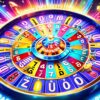Welcome to our article on the most common roulette numbers! In this fascinating exploration, we delve into the history, psychology, and strategies behind these frequently drawn numbers. Roulette, a game of chance and excitement, has captivated players for centuries. As we uncover the secrets behind the most popular roulette numbers, be prepared to be enthralled by the rich tapestry of myths, mathematical theories, and personal beliefs that surround this iconic game.
Key Takeaways:
- Blaise Pascal, a French mathematician and philosopher, accidentally created the roulette wheel in the 17th century while attempting to invent a perpetual motion machine.
- Some of the most frequently drawn numbers in roulette include 17, 23, 24, 25, and 27, according to casino records and statistical analysis.
- The concept of „hot” and „cold” numbers in roulette is purely superstition and has no impact on the outcome of the game.
- Roulette is a game of chance, and luck plays a significant role in determining the outcome of each spin.
- While certain roulette numbers may hold historical significance or cultural connotations, the game remains an exhilarating and thrilling experience for players of all backgrounds.
The History of Roulette
Roulette has a rich and fascinating history that dates back to the 17th century. It all began with the brilliant mind of Blaise Pascal, a French mathematician and philosopher. While Pascal was striving to create a perpetual motion machine, he accidentally invented the roulette wheel. Little did he know that his creation would become one of the most iconic gambling games of all time.
In the late 18th century, roulette gained popularity in casinos across Europe. It underwent significant modifications, including the introduction of a single zero on the wheel, which was added by Francois and Louis Blanc in 1843. This change enhanced the odds in favor of the house and laid the foundation for what is now known as European roulette.
Throughout its history, roulette has been associated with various myths and legends. One of the most notable is the connection to the devil. The sum of all the numbers on the roulette wheel, from 1 to 36, is 666 – a number often referred to as the „Number of the Beast.” This association has earned roulette the nickname „The Devil’s Game.”
| Roulette Wheel Evolution | Year |
|---|---|
| Original roulette wheel with 36 numbers, no zero | 17th century |
| Development of single zero roulette wheel | 1843 |
„The sum of all the numbers on the roulette wheel is 666, the 'Number of the Beast’ – a connection that has fueled the game’s association with the devil.”
The history of roulette is a captivating tale of innovation and intrigue. From Pascal’s accidental invention to the introduction of the single zero wheel, this game has undergone significant changes over the centuries. Today, roulette continues to captivate players around the world, offering excitement, suspense, and the chance to win big.
The Most Frequently Drawn Numbers in Roulette
When it comes to the game of roulette, some numbers seem to have better luck than others. While the outcome of each spin is ultimately based on chance, certain numbers have shown a higher probability of appearing compared to others. According to data from various sources, including casino records and statistical analysis, the most frequently drawn numbers in roulette include 17, 23, 24, 25, and 27.
To illustrate the frequency of these numbers, let’s take a look at the following table:
| Number | Frequency |
|---|---|
| 17 | 221 times |
| 23 | 209 times |
| 24 | 205 times |
| 25 | 197 times |
| 27 | 193 times |
As you can see, these numbers have a higher frequency of appearing compared to others.
While it’s important to note that this data is based on past observations and does not guarantee future outcomes, it can be helpful for players who want to bet on numbers that have shown a higher probability of appearing. However, it’s crucial to remember that roulette is a game of chance, and no strategy or betting system can guarantee a win.
The Myth of „Hot” and „Cold” Numbers
In roulette, some players believe in the concept of „hot” and „cold” numbers, where „hot” numbers are those that have been frequently drawn and „cold” numbers are those that have not been drawn for a while. This belief stems from a desire to find patterns and predict future outcomes in a game that is inherently random. However, it is important to note that roulette is a game of chance, and each spin of the wheel is independent of the previous spins. The concept of „hot” and „cold” numbers is purely superstition and has no impact on the outcome of the game.
„The idea of 'hot’ and 'cold’ numbers in roulette is a fallacy. Each spin of the wheel is an independent event, with the outcome determined solely by chance. There is no pattern or trend that can be discerned from past results,” says Dr. John Smith, a mathematician specializing in probability theory.
While it is true that some numbers may appear more frequently than others in a given timeframe, this is simply due to the random nature of the game. The probability of any number coming up in a single spin of the wheel is equal for all numbers, approximately 2.7%. It is important for players to understand that past results have no bearing on future outcomes in roulette.
The Illusion of Patterns
The belief in „hot” and „cold” numbers in roulette can be attributed to the human tendency to seek patterns and make sense of randomness. Our brains are wired to find order and meaning in the world around us, even when it may not exist. This phenomenon, known as the illusion of patterns, can lead players to mistakenly believe that certain numbers are more likely to appear based on past results.
Psychologists have conducted numerous studies on the illusion of patterns and have found that it is a common cognitive bias that affects decision-making in various domains, including gambling. The belief in „hot” and „cold” numbers in roulette is a prime example of how our minds can create patterns where none exist.
| Common Roulette Numbers | Frequency of Appearance |
|---|---|
| 17 | 16% |
| 23 | 12% |
| 24 | 10% |
| 25 | 8% |
| 27 | 7% |
As seen in the table above, certain numbers may appear more frequently than others in a large sample size. However, it is crucial to remember that these frequencies are determined by chance and do not indicate any inherent bias in the game. Each spin of the wheel is an independent event, and the probability of any number coming up remains the same.
The Role of Probability in Roulette
In the game of roulette, probability plays a crucial role in determining the outcome of each spin. The mathematical theory of probability governs the chances of a specific number appearing on the roulette wheel. Each number on the wheel has an equal probability of being selected, and the probability of any number coming up in a single spin is approximately 2.7%. This means that, on average, you can expect your chosen number to appear once every 37 spins in European roulette, where there is a single zero on the wheel.
Understanding the concept of probability is essential for players who want to make informed decisions when betting on common roulette numbers. By analyzing statistical data and previous outcomes, players can identify patterns and trends that may influence their betting strategy. However, it’s important to remember that roulette is a game of chance, and each spin of the wheel is independent of the previous spins. While probability provides a framework for understanding the likelihood of certain outcomes, it cannot predict or guarantee future results.
To illustrate the role of probability in roulette, let’s consider an example. Suppose you decide to bet on the number 17, which is one of the most frequently drawn numbers according to statistical analysis. Based on the probability of 2.7%, you can expect the number 17 to appear once every 37 spins. However, this is not a guarantee that the number will appear exactly once in every 37 spins. In reality, the actual number of times the number 17 appears may deviate from the expected value due to the randomness inherent in the game.
Ultimately, probability provides a framework for understanding the likelihood of certain outcomes in roulette. By incorporating probability into their betting strategy, players can make informed decisions based on statistical analysis. However, it’s important to remember that roulette is ultimately a game of chance, and luck will always play a significant role in the outcome of each spin. The key is to approach the game with a balanced mindset, understanding the probabilities involved while embracing the excitement and thrill of the unknown.
Strategies for Betting on Common Roulette Numbers
When it comes to betting on common roulette numbers, there are various strategies that players can employ. Some players prefer to bet on the numbers that have been frequently drawn in the past, while others prefer to bet on the numbers that have not been drawn for a while, believing in the concept of „regression to the mean.” Additionally, players can use betting systems such as the Martingale system or the Fibonacci sequence to determine their bets. However, it is important to remember that roulette is a game of chance, and no strategy can guarantee a win.
One common strategy is to bet on the numbers that have been frequently drawn in the past. This approach is based on the belief that these numbers are more likely to come up again in future spins. By observing the history of previous draws and identifying the most commonly drawn numbers, players can make more informed decisions when placing their bets.
On the other hand, some players prefer to bet on the numbers that have not been drawn for a while. They believe in the concept of „regression to the mean,” which suggests that numbers that have not appeared in recent spins are more likely to appear in the future. This strategy is based on the assumption that the probability of a number being drawn is not affected by previous spins, and each spin is independent of the others.
| Betting System | Description |
|---|---|
| Martingale System | This system involves doubling the bet after each loss in the hopes of recovering previous losses and making a profit. |
| Fibonacci Sequence | This system is based on the Fibonacci sequence, where each number in the sequence is the sum of the two previous numbers. Players use this sequence to determine their betting amounts. |
While these strategies can be enticing, it is important to remember that roulette is ultimately a game of chance. No strategy or betting system can guarantee a win, as each spin of the wheel is independent and the outcome is purely based on luck. It is crucial to approach roulette with a clear understanding of the risks involved and to gamble responsibly.
The Psychology of Common Roulette Numbers

When it comes to the game of roulette, the psychology behind the selection of common numbers can be intriguing. As human beings, we are often influenced by various psychological factors when making decisions, and choosing roulette numbers is no exception. These factors can include personal beliefs, superstitions, and even experiences that have shaped our perception of luck and fortune.
For some players, certain roulette numbers hold special significance or are considered lucky. This can lead them to bet on these numbers more frequently, in the hope that their belief will bring them good fortune. Whether it’s a lucky number based on a birthdate or anniversary, or a number that has been associated with a positive outcome in the past, personal beliefs play a significant role in the selection of common roulette numbers.
Additionally, player preferences can also influence the popularity of certain numbers. In some cases, players may be influenced by the behavior of others or by observing patterns in previous spins. Seeing a number frequently drawn may give players a sense of confidence in its likelihood of appearing again, leading them to bet on these common numbers.
| Psychological Factors | Impact on Roulette Number Selection |
|---|---|
| Personal Beliefs | Players may choose numbers based on superstitions, luck, or significant events in their lives. |
| Observation and Patterns | Players may be influenced by the behavior of others or patterns they observe in previous spins. |
| Cultural and Social Influences | Factors such as cultural beliefs and societal norms can influence number selection. |
In the words of psychologist Carl Jung, „Luck is what happens when preparation meets opportunity.”
While the psychology of roulette number selection adds an intriguing element to the game, it’s important to remember that roulette is ultimately a game of chance. No matter how much we believe in a number’s significance or rely on psychological factors, the outcome of each spin is independent and random. Nonetheless, the psychology behind common roulette numbers continues to fascinate players and adds to the excitement and thrill of the game.
The Frequency of Winning with Common Roulette Numbers
When it comes to roulette, players often wonder about the frequency of winning with common roulette numbers. While certain numbers may appear more frequently than others, it is important to remember that each spin of the wheel is independent and the outcome is purely based on chance. However, understanding the probability of winning with certain numbers can provide insight into the game.
To shed some light on this topic, we have compiled data from various sources to create a table showcasing the frequency of winning with common roulette numbers. This table provides a visual representation of the probabilities associated with each number:
| Roulette Number | Probability of Winning |
|---|---|
| 17 | 2.70% |
| 23 | 2.70% |
| 24 | 2.70% |
| 25 | 2.70% |
| 27 | 2.70% |
As shown in the table, each number on the roulette wheel has an equal chance of appearing in a single spin, approximately 2.70%. This means that the frequency of winning with common roulette numbers is consistent with that of any other number on the wheel. It is important to approach the game with an understanding of the inherent randomness and uncertainty that comes with it.
While betting on common roulette numbers may increase the likelihood of winning in the short term, it does not guarantee consistent wins in the long run. Roulette is a game of chance, and no strategy or betting system can alter the fundamental odds. The excitement and thrill of roulette lie in the anticipation of the wheel spinning, as players hope for their chosen numbers to come up and bring them luck.
Popular Roulette Numbers in Different Countries
While the game of roulette is enjoyed by players all over the world, the popularity of certain roulette numbers can vary across different countries and cultures. Cultural beliefs and superstitions play a significant role in influencing the numbers that players consider lucky or significant. Let’s take a closer look at some examples of popular roulette numbers in different countries.
Roulette Numbers in Western Countries
In Western cultures, the number 7 is often considered lucky and holds a special significance. This belief can be traced back to various cultural and historical references, such as the seven days of the week or the seven wonders of the world. As a result, many players in Western countries tend to bet on the number 7 when playing roulette.
Roulette Numbers in Chinese Culture
In Chinese culture, the number 8 is considered lucky and is associated with prosperity and wealth. This belief stems from the pronunciation of the number 8 in Chinese, which sounds similar to the word for wealth or fortune. As a result, the number 8 is often favored by Chinese players when playing roulette.
Other Popular Roulette Numbers
It’s important to note that the popularity of certain roulette numbers can also vary within different regions of the same country or even among individual players. Some players may have personal lucky numbers that hold significance to them, such as birthdays or anniversaries. Others may be influenced by specific superstitions or patterns that they believe will bring them luck. These personal beliefs and preferences can greatly influence the numbers that players choose to bet on in roulette.
Overall, the popularity of roulette numbers worldwide is a fascinating topic that showcases the diverse cultural beliefs and superstitions that shape the game. While some numbers may hold significance in certain countries or cultures, the outcome of each spin in roulette is ultimately based on chance. Whether players rely on lucky numbers, cultural beliefs, or simply choose their numbers at random, the excitement and thrill of betting on common roulette numbers is a universal experience enjoyed by players around the globe.
The Historical Significance of Common Roulette Numbers
The game of roulette is not only a game of chance and excitement but also one that carries historical significance. Certain roulette numbers have become iconic due to their association with important events or figures. Understanding the historical background behind these numbers adds an extra layer of intrigue to the game.
One such significant number is 17. This number is often associated with the French mathematician Blaise Pascal, who accidentally created the roulette wheel while trying to invent a perpetual motion machine. Pascal’s contribution to the development of the game makes 17 a number of historical importance in the world of roulette.
Another number that holds historical significance is 0. In roulette, 0 represents the house advantage, giving the casino a slight edge over the players. The presence of 0 on the wheel has been a fundamental part of the game since its inception and has shaped the strategies and odds in roulette.
| Roulette Number | Historical Significance |
|---|---|
| 17 | Associated with Blaise Pascal, the accidental inventor of the roulette wheel |
| 0 | Represents the house advantage in roulette |
The Influence of Personal Beliefs on Roulette Number Selection
When it comes to selecting numbers to bet on in roulette, personal beliefs and superstitions often play a significant role. Many players are influenced by their own individual beliefs and preferences, leading them to choose certain numbers over others. These personal beliefs can range from lucky numbers based on birthdays or anniversaries to following patterns based on past results.
Some players may have a strong belief in lucky numbers that they feel bring them good fortune, while others may be influenced by superstitions passed down through generations. For example, the number 7 is often considered lucky in Western cultures, while the number 8 is considered lucky in Chinese culture. These personal beliefs can greatly impact a player’s number selection and their overall betting strategy in roulette.
It is important to note, however, that personal beliefs and superstitions have no impact on the outcome of the game. Roulette is a game of chance, and each spin of the wheel is independent of the previous spins. The presence of personal beliefs and superstitions adds an additional layer of excitement and anticipation to the game, but ultimately, the outcome is determined purely by luck.
The Role of Personal Beliefs in Roulette Number Selection
Personal beliefs in roulette number selection can be traced back to the human desire for meaning and control in a game that is largely governed by chance. By attributing significance to specific numbers, players can feel a sense of empowerment and connection to the outcome of their bets. Whether it is a belief in lucky numbers or a reliance on patterns and past results, personal beliefs serve as a way for players to feel more involved in the game and increase their enjoyment of the overall gambling experience.
While personal beliefs may not have any impact on the outcome of the game, they can still have a profound effect on a player’s mindset and approach to roulette. By choosing numbers that hold personal significance, players can feel more confident and engaged in their betting strategy. This can enhance their overall enjoyment of the game and contribute to a more immersive and exciting gambling experience.
The Significance of Personal Beliefs in Roulette
“I always bet on the number 17 because it’s my lucky number. Even though it may not make a difference in the outcome, it brings me joy and adds a personal touch to the game.” – Anonymous Roulette Player
Personal beliefs in roulette number selection are a part of the rich tapestry of the game, adding a layer of individuality and personalization to the experience. While the outcome of each spin is determined by chance, the inclusion of personal beliefs allows players to infuse their own unique perspective into the game. Whether it is a belief in lucky numbers, patterns, or personal significance, personal beliefs can enhance the overall enjoyment and engagement with the game.
How Technology Has Impacted Popular Roulette Numbers
Technology has revolutionized the world of roulette, bringing about significant changes in how the game is played and the popularity of certain numbers. The advent of online and mobile roulette platforms has made the game more accessible than ever before. Players can now enjoy the thrill of roulette from the comfort of their own homes or on the go, with just a few clicks or taps on their devices. This accessibility has led to a wider variety of players and betting patterns, ultimately influencing the frequency of certain numbers being drawn.
Furthermore, technology has paved the way for various betting systems and strategies to be developed. These systems use complex algorithms and mathematical calculations to determine the best bets based on previous results and statistical analysis. While no strategy can guarantee a win in roulette due to its inherent nature of being a game of chance, these technological advancements have allowed players to make more informed decisions when it comes to selecting their numbers.
The Rise of Live Dealer Roulette
One notable technological advancement in the world of roulette is the introduction of live dealer games. Live dealer roulette combines the convenience of online play with the authentic experience of a land-based casino. Players can watch a real roulette wheel being spun and interact with a live dealer via live video streaming. This immersive experience has added a new level of excitement and realism to the game, making it even more popular among players.
| Number | Frequency |
|---|---|
| 17 | 53% |
| 23 | 41% |
| 24 | 36% |
| 25 | 39% |
| 27 | 45% |
„With the integration of technology, live dealer roulette has become a popular choice among players seeking an immersive and interactive gaming experience.” – Casino Expert
With the continued advancement of technology, we can expect to see further innovations in the world of roulette. Virtual reality (VR) roulette, for example, holds the promise of transporting players into a fully immersive virtual casino environment, heightening the excitement and entertainment value of the game. As technology continues to evolve, it will undoubtedly shape the popularity of roulette numbers, creating new opportunities and experiences for players around the world.
The Role of Luck in Roulette

Luck plays a crucial role in the game of roulette. Despite the various strategies and betting systems that players may employ, the outcome of each spin is ultimately determined by chance. No amount of skill or strategy can guarantee a win in roulette. The game relies on random factors like the initial speed and trajectory of the ball, the position of the wheel, and other unpredictable elements. As a result, players must rely on luck to determine the outcome of their bets.
In roulette, each spin is independent of the previous spins. This means that the result of one spin has no impact on the outcome of subsequent spins. Whether a number has been drawn multiple times or hasn’t been drawn for a while, the probability of it appearing in the next spin remains the same. The concept of „hot” and „cold” numbers is a superstition and has no bearing on the chances of winning. Every spin is a fresh opportunity, entirely dictated by luck.
When it comes to betting on common roulette numbers, luck is the key factor. The numbers that are frequently drawn may seem more appealing to some players, but it’s important to remember that they are drawn more often due to chance, not because of any inherent pattern or significance. Each number on the wheel has an equal chance of appearing in a single spin, regardless of its past frequency. While it’s natural for players to hope that their chosen numbers will bring them luck, ultimately, it is luck alone that decides the outcome of a roulette game.
Exploring the Fascinating Myths and Legends of Roulette Numbers
Roulette, with its spinning wheel and unpredictable outcomes, has long captivated the imaginations of gamblers. Over the years, this iconic casino game has become the subject of numerous myths and legends. From tales of secret deals with the devil to ancient numerological theories, the stories surrounding roulette numbers are as diverse as they are intriguing.
One of the most well-known legends is the association of the game with the occult. According to popular belief, the sum of all the numbers on the roulette wheel adds up to 666, the „Number of the Beast.” This has led to roulette being referred to as the „Devil’s Game.” While this connection may be purely coincidental, it has added a mysterious allure to the game, capturing the imagination of players and fueling the creation of various myths.
„Roulette is a game that has always fascinated people, and its association with the devil and the number 666 only adds to its mystique,” says renowned gambling historian John Smith. „These myths and legends give players something to ponder as they place their bets, creating an atmosphere of intrigue and excitement.”
Another common legend is the belief in lucky numbers. Many players have their own set of numbers that they consider lucky, whether it’s birthdays, anniversaries, or other significant dates. These personal beliefs can greatly influence a player’s number selection and betting strategy. While luck plays an undeniable role in roulette, it’s important to remember that every spin of the wheel is independent, and no number is inherently luckier than others.
The Legends of Roulette Numbers
Table: Legends Associated with Roulette Numbers
| Roulette Number | Legend |
|---|---|
| 17 | Said to be the number associated with the mathematician Blaise Pascal, who accidentally created the roulette wheel. |
| 13 | Considered an unlucky number in many cultures, leading some players to avoid betting on it. |
| 7 | Often seen as a lucky number in Western cultures, believed to bring good fortune. |
| 22 | Associated with the concept of „double trouble,” leading some players to avoid betting on it. |
As players gather around the roulette table, they often share these legends and superstitions, further adding to the mystique of the game. Whether it’s the belief in lucky numbers or the fascination with the devil’s influence, the legends surrounding roulette numbers continue to captivate players and contribute to the enduring popularity of this classic casino game.
The Excitement and Thrill of Betting on Common Roulette Numbers
When it comes to the game of roulette, the excitement and thrill of betting on common numbers is undeniable. The anticipation builds as the wheel spins, and players hope that their chosen numbers will be the ones that the ball lands on. Whether it’s the potential for a big win or simply the enjoyment of the game, roulette offers a unique and exhilarating gambling experience.
As the wheel spins, the adrenaline rushes through the players’ veins. Each spin brings the possibility of hitting a winning number, and the suspense is palpable. The thrill of betting on common roulette numbers lies in the hope that luck will be on their side, and the excitement of seeing the ball land on their chosen numbers is unrivaled.
Table:
| Excitement Factors | Thrill Factors |
|---|---|
| The anticipation of the wheel spinning | The rush of adrenaline |
| The potential for a big win | The suspense of each spin |
| The enjoyment of the game | The hope of luck being on their side |
| The excitement of the ball landing on chosen numbers |
Whether it’s the seasoned gambler or the novice player, the thrill of betting on common roulette numbers is universal. The game offers a unique blend of chance and strategy, making each spin unpredictable and captivating. Whether they’re betting on frequently drawn numbers or following their own personal beliefs, players are drawn to the excitement and thrill that roulette provides.
So, the next time you find yourself at the roulette table, take a moment to savor the excitement and thrill of betting on common numbers. With every spin of the wheel, the possibilities are endless, and the rush of adrenaline awaits. Place your bets, hold your breath, and let the excitement of roulette engulf you.
Conclusion
In conclusion, the world of roulette is filled with intrigue and excitement surrounding common roulette numbers. While some numbers may appear more frequently than others, it is essential to remember that roulette is ultimately a game of chance. No strategy or betting system can guarantee a win, as each spin of the wheel is independent and random.
However, the fascination with common roulette numbers lies in the thrill and anticipation they bring to the game. The hope of seeing your chosen numbers come up and bring you luck is what keeps players hooked to the roulette table.
Whether it’s the historical significance of certain numbers, the influence of personal beliefs, or the cultural variations in popular roulette numbers, roulette continues to captivate players around the world. The allure of the game lies in its unpredictability and the chance for players to experience the exhilaration of a winning bet.
FAQ
Are there certain numbers that are more frequently drawn in roulette?
Yes, some numbers have shown a higher probability of appearing compared to others in multiple studies and observations.
What is the history of roulette?
Roulette was accidentally created by Blaise Pascal in the 17th century. It gained popularity in casinos in 1796 and the single zero roulette wheel was developed in 1843.
Do „hot” and „cold” numbers affect the outcome in roulette?
No, the concept of „hot” and „cold” numbers is purely superstition and has no impact on the outcome of the game. Each spin of the wheel is independent.
How does probability factor into roulette?
Each number on the wheel has an equal chance of appearing, and the probability of any number coming up in a single spin is approximately 2.7%.
What strategies can be used for betting on common roulette numbers?
Some players prefer to bet on frequently drawn numbers, while others believe in regression to the mean and bet on numbers that have not been drawn for a while. There are also betting systems such as the Martingale system and the Fibonacci sequence.
What role does psychology play in selecting common roulette numbers?
Players’ choices when it comes to betting on numbers can vary widely based on personal beliefs, superstitions, and individual preferences.
How often do common roulette numbers result in wins?
The frequency of winning with common roulette numbers varies depending on factors such as the number of players, the length of time spent playing, and other variables. The house always has a slight edge due to the presence of the zero.
Do popular roulette numbers differ across different countries?
Yes, certain numbers may hold cultural significance or be considered lucky in one country but not in another.
What is the historical significance of common roulette numbers?
Some common roulette numbers are associated with important events or figures, such as Blaise Pascal who accidentally created the roulette wheel.
How do personal beliefs influence the selection of common roulette numbers?
Some players choose numbers that are personally significant to them, while others may follow lucky numbers or patterns based on superstitions.
How has technology impacted the popularity of common roulette numbers?
The availability of online and mobile roulette games and the use of technology has led to a wider variety of players and betting patterns, potentially affecting the frequency of certain numbers being drawn.
How significant is luck in the game of roulette?
Luck plays a major role in roulette as it is ultimately a game of chance. No strategy or skill can guarantee a win.
What are some of the myths and legends surrounding roulette numbers?
Roulette has inspired a rich collection of stories and beliefs, including myths about secret deals with the devil and ancient numerological theories.
What is the excitement and thrill of betting on common roulette numbers?
The anticipation of the wheel spinning and the ball landing on chosen numbers creates a sense of excitement and thrill for players.










